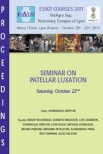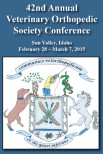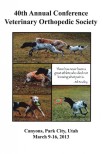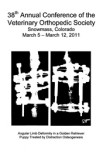Summary
Reasons for performing study
The pathogenesis of osteochondrosis (OC) and palmar/plantar first phalanx osteochondral fragments (POFs) is multifactorial, but specific knowledge of heritability is limited.
Objectives
To improve the precision of heritability estimates and to estimate the genetic correlation between tarsocrural OC and POFs in Standardbred trotters. Further aims were to examine whether the prevalence of OC/POFs was different in the American and French lineages that have contributed to the Norwegian population, and if the prevalence was affected by heterozygosity.
Study design
Retrospective cohort study.
Methods
Categorical data on tarsocrural OC and POFs from 2 radiographic studies performed in 1989 and 2007/2008 (n = 1217) were analysed with sire threshold models that included 230 sires.
Results
Heritability of OC at the distal intermediate ridge of the tibia and/or the lateral trochlear ridge of the talus was estimated at 0.29 ± 0.15. For OC at the distal intermediate ridge of the tibia only, the estimate was 0.40 ± 0.17. Heritability of POFs in all 4 limbs was estimated at 0.23 ± 0.13; for metatarsophalangeal POFs this was 0.26 ± 0.13 and for medial metatarsophalangeal POFs 0.32 ± 0.14. Estimates of genetic correlation between OC and POFs ranged from 0.68 ± 0.27 to 0.73 ± 0.28 but were not significantly different from a zero-genetic correlation. Effects of lineages or heterozygosity were not observed.
Conclusions and potential relevance
This study confirmed a moderate to high heritability of tarsocrural OC and POF, providing further evidence of the heritable nature of these diseases. Examination of specific lesions yielded the highest heritability; therefore, breeding programmes and future genome-analysis studies should focus on predilection sites rather than the entire disease complex.









